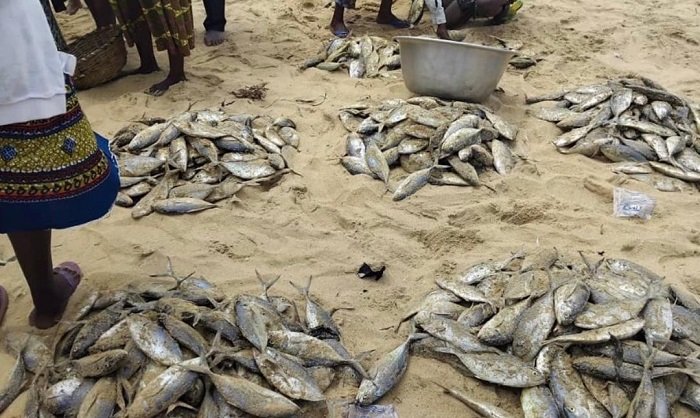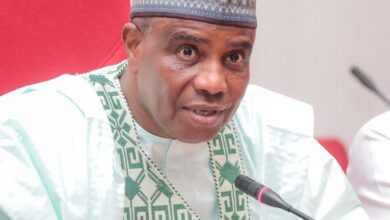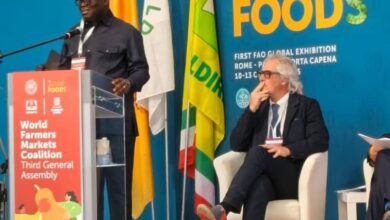Ghana’s 2025 Fisheries Reforms: Community efforts bring Volta’s fish back

When the fishing canoes of Adina and neighbouring coastal communities began returning to shore in August, the scene resembled a festival.
Nets came in heavy with anchovies, small cod and other small pelagic species — a striking contrast to the lean years locals had come to dread.
Women traders sang as they sorted their baskets; processors rushed to smoke, salt, and dry the fresh haul before the afternoon sun dipped.
For the fishing communities along the Volta Region’s coast, this bounty was no accident of nature. It was the visible outcome of recent fisheries reforms — anchored in law, policy, and grassroots engagement — that began to take hold in 2025.
Policy at work: Trawlers pushed offshore
In early 2025, the Ministry of Fisheries and Aquaculture Development tightened restrictions on industrial trawlers, mandating that they operate farther offshore and adhere strictly to closed-season directives.
A two-month closure (July–August) was imposed on industrial vessels, while artisanal canoe fishers — who depend on seasonal catches for survival — were exempted.
For the first time in years, enforcement was consistent. Licenses of defaulting trawler operators were suspended, and others were publicly named for violations, signalling that the rules were no longer mere words.
These measures, combined with ongoing stock recovery efforts, helped reduce nearshore fishing pressure and allowed smaller species to spawn undisturbed.
The result? Cleaner waters, more fish near the coast, and renewed hope for Ghana’s small-scale fishers.
Community Education
Mr Kwesi Randolph Johnson, Local Supervisor of the fisher-led research initiative “Sankofa Project”, implemented by the University of St. Andrews, said ongoing fisheries and coastal resilience efforts had been instrumental in bridging policy and practice.
Through engagements in several coastal communities, the Sankofa Project team — comprising personnel from the University of St. Andrews, Ghana’s Fisheries Commission, the Fisheries Committee for the West and Central Gulf of Guinea, and the Canoe and Fishing Gear Owners Association — worked closely with fishers in pilot communities to gather data that informed policy, particularly in integrating indigenous knowledge into scientific frameworks.
“These research initiatives emphasised returning to the sustainable fishing practices of our forefathers — respecting marine resources and observing traditional norms,” Mr Johnson stated.
Sister initiatives by long-standing non-government organisations (NGOs) also collaborated with the Fisheries Commission to monitor fish stock trends, offer alternative livelihoods to coastal youth, and educate communities on the dangers of Illegal, Unreported, and Unregulated (IUU) fishing.
Topical concerns included the use of harmful chemicals, light fishing, and inappropriate gear that damage marine ecosystems and jeopardise future catches.
“These dialogues not only build trust but also deepen awareness that sustainability begins at the community level. The message is resonating: more fishers now recognise that responsible practices protect their livelihoods and those of future generations,” he added.
Non-state and state initiatives align
According to Mr Johnson, the 2025 success in the Volta Region reflects the cumulative impact of multiple interventions — from government enforcement to NGO-led campaigns, academic research, indigenous data integration, and donor-supported projects.
“Organisations along the coast — including local advocacy groups, conservation NGOs, and women fish processors’ associations — have complemented state policy with community sensitisation, mangrove restoration, and training in eco-friendly fish handling,” he elaborated.
He added: “Though progress is slow, it is steady. The collective actions of state and non-state actors are finally bearing fruit, showing that when governance, awareness, and enforcement align, even the most degraded fisheries can rebound.”
Rule of law and the joy of justice
Community leaders — who spoke to the Ghana News Agency (GNA) — credited the firm stance against industrial excesses and the moral authority of empowered communities for restoring balance to a sector that had teetered on collapse.
“In areas where the laws work and fairness prevails, blessings flow and the people are happy,” they said.
Volta’s return of the catch
In all three coastal districts — Ketu South, Keta, and Anloga — fishers and traders quickly noticed the deterrence.
“During the years of empty nets, we could barely pull this one up,” said one canoe owner with a broad grin. “It’s been long since the sea gave like this.”
Local observers attributed success to both enforcement and collaboration. The Volta Estuary, long threatened by illegal trawling and destructive gear, has shown signs of recovery.
Challenges
The catch boom, though welcome, exposed market vulnerabilities. Without adequate cold storage and processing infrastructure, gluts quickly depressed prices, forcing fishers to sell at a loss.
Torgbui Emmanuel Anomoo Tettey, the Chief Fisherman of Salakope and spokesperson for Volta Region fishermen, said catches were generally good across the region, attributing the abundance to multiple factors — including good fortune.
“At one point, anchovy harvests at Adina and other areas were so plentiful that prices plummeted — from GH¢1,700 to GH¢1,200, and even as low as GH¢100 in Adina. Fishers had to sell on credit; yet still they needed funds for premix fuel and other essentials,” he explained, adding, “but now in October, the bumper season is over, and anchovies — popularly known as ‘Keta school boys’ — are scarce.”
Despite the low prices at landing beaches during the boom, climate variability and market dynamics meant consumers saw little change in retail prices.
Madam Mansa Awunyo, a fish trader at Keta Market, explained that wholesale prices are only available at dawn — between 4:30 and 5:00 a.m. “Arriving later means buying from second or third sellers at higher prices,” she added.
In Adina, suspicions over the consistent anchovy harvests led some fishmongers to boycott catches, fearing IUU practices.
Ablavinor, a fish seller at Aflao Market, emphasised the hidden costs: “It’s wrong to assume that cheap fish at the shore means cheap fish at the market. There’s transport, processing, porters, firewood, oil, salt — and with the rain, much of the dried fish spoils. If you buy GH¢1,000 worth and half of it goes bad, must you not adjust the price to survive?”
The road ahead
Experts say these challenges highlight the need for integrated management — not just conservation, but also fair markets, post-harvest infrastructure, and credit support.
Mr William Agbenu, Volta Regional Director of Fisheries, noted that while Adina experienced a bumper harvest, other beaches saw “normal landing fluctuations.”
He emphasised the need for “private sector-led investment in energy-smart, climate-resilient cold storage facilities at major landing beaches like Adina to reduce post-harvest losses,” adding that such infrastructure would help stabilise prices and benefit fishers, traders, and consumers alike.
The Volta Region’s 2025 bumper catch is a timely reminder that sound policy, community participation, and ethical governance can turn the tide.
But as Mr Johnson cautioned, lasting recovery depends on:
- Continuous enforcement against illegal industrial operations.
- Investment in cold-chain and market infrastructure.
- Strengthened co-management among canoe owners, processors, and local councils.
- Ongoing public education through initiatives like the Sankofa Project.
With these in place, the joy on Volta Region’s beaches may become a sustainable story of renewal — where the ocean’s gifts are harvested wisely, shared fairly and conserved for generations to come.
— GNA
🔗 Follow Ghanaian Times WhatsApp Channel today. https://whatsapp.com/channel/0029VbAjG7g3gvWajUAEX12Q
🌍 Trusted News. Real Stories. Anytime, Anywhere.
✅ Join our WhatsApp Channel now! https://whatsapp.com/channel/0029VbAjG7g3gvWajUAEX12Q






